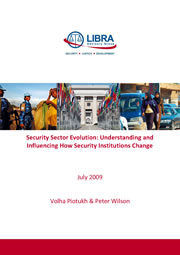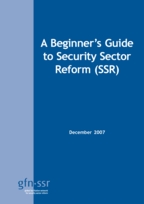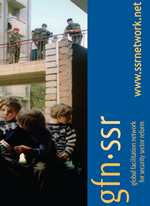Libra Advisory Group
Volha Piotukh & Peter Wilson
July 2009
Pages: 37
Electronic size: 718 kB
Download full version in pdf format.
Summary:
The aim of this paper is to make a contribution to the under-theorised field of Security Sector Reform (SSR) studies (Egnell and Halden, 2009) and to support better design, implementation and review of SSR programmes. We borrow, from economics and strategic management, some perspectives on institutional change and we consider the implications of these insights for approaches to SSR.
Many current approaches to SSR adopt, implicitly, a rationalist approach which assumes that projects can be designed and implemented with a reasonable degree of certainty based on a high-level of advance knowledge. We believe this significantly under-estimates the complexity of SSR and over-estimates the degree to which reform can be planned in advance. Fortunately, alternative perspectives on institutional change are emerging which are better placed to deal with the complexity inherent in SSR. These perspectives include the evolutionary approach and the organisational learning approach1. Our choice is informed by the belief that the evolutionary approach can be seen as “a generic framework for understanding social change” (Aldrich and Ruff, 2006 p. xi). It is focused on how behaviour becomes dominant through a process of variation, selection, retention and struggle; can be applied at different levels of analysis; and is flexible enough to accommodate other perspectives, with the organisational learning approach being the most compatible with its logic. We will argue that an evolutionary approach to SSR can make the reform process more democratic, and lead to transformations that are locally-owned and sustainable.
Using the cases of SSR in Sierra-Leone and Iraq as examples, we will argue that the evolutionary approach to SSR can and does work in practice. Whilst by definition it cannot provide a single, universally applicable, model, or a ready-made solution for a particular security sector, it can serve as an overall framework enabling the generation of a number of alternative models, selection of the most appropriate ones, and replication of those that have proved to be successful.
We separate this paper into two distinct parts. Part 1 gives an overview of theoretical approaches to institutional change and argues that the evolutionary approach is the best for understanding and managing SSR. It will be of most interest to SSR theorists. Part 2 tests these arguments against experience in Sierra Leone and Iraq and discusses how the evolutionary approach can be implemented in practice. We hope this part will begin to translate theory into action. We include in an Annex a description of other approaches to institutional reform, in the hope that this will prompt greater cross-fertilisation between economics, business strategy and security sector reform.










